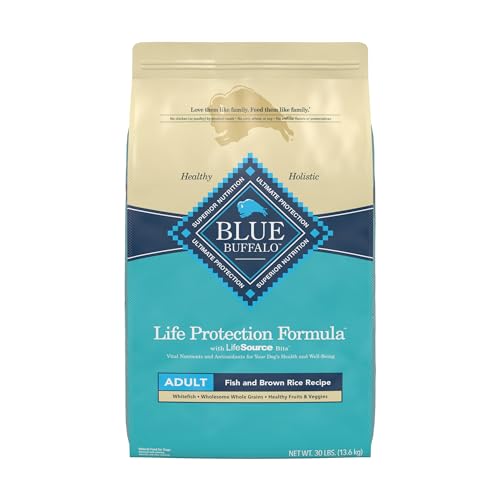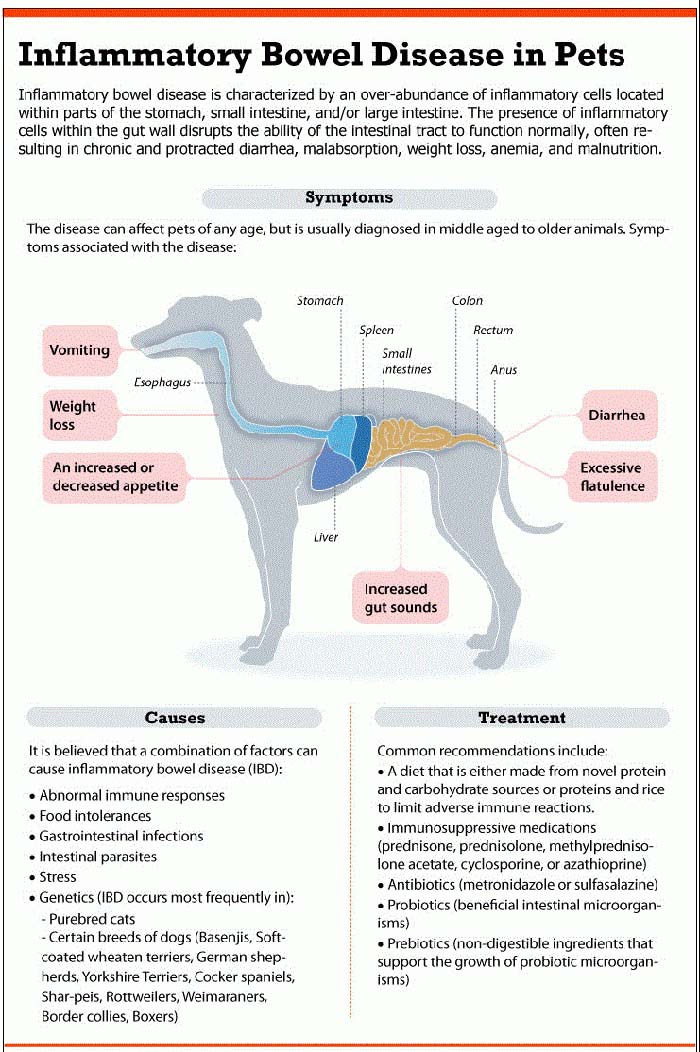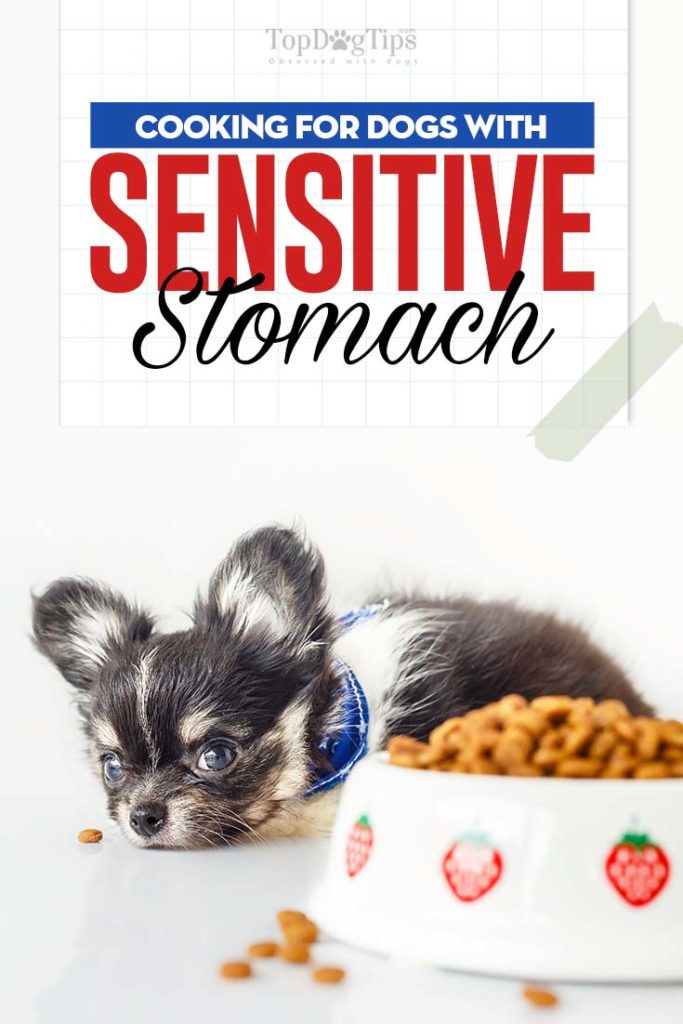
Table of Contents
If you have a dog with a sensitive stomach and constant digestive disorders, then adjusting their diet is likely the only way to fix the problem.
Dietary changes, when done gradually, have been shown to be most effective in helping dogs with sensitive stomachs.
Raising a dog with a sensitive stomach doesn't have to be difficult.
Once you figure out the cause, all you need to do is avoid those triggers.
The most difficult (or long) part is the trial-and-error of switching foods to find out the culprit. After that's done, you can easily manage the condition.
In this article, we'll discuss how to feed dogs with sensitive stomachs and explore some dietary guidelines that you should keep in mind when making the change.
I will also include a few recipes of homemade dog food for sensitive stomachs if you choose to cook for your dog yourself instead of using a commercial brand.
What is a Sensitive Stomach in Dogs?
Sensitive stomach is a generic medical term used to describe various digestive problems in dogs that are not caused by some other disease or illness and which are usually mild in nature.
Dogs with sensitive stomachs can be born with this condition, or they can develop it later in life for a variety of reasons.
Sensitive stomachs in dogs can become an issue as a result of some other ailment, but it can also lead to more serious health problems if left untreated.
If you need to learn more about digestive disorders in dogs, take a look at the Merck Vet Manual resource.
A sensitive stomach can affect dogs of all breeds, sizes, and ages. However, puppies and senior dogs are more prone to have sensitive stomachs than adult dogs.
Also, some breeds, like Scottish and Yorkshire Terriers and a few other small breeds, are more susceptible to this digestive health problem along with other GI-related issues.
Dog Sensitive Stomach Diet
The best way to fight this issue is with diet changes that are specifically designed for your individual dog's condition.
Once you have determined the ingredients that are causing stomach upset in a dog, then you can plan a diet that will suit those specific needs.
A Few Quick Tips
Begin by simplifying your dog’s diet. You should eliminate all unnecessary things that are not a part of the dog's regular diet – table scraps, low-quality treats, etc.
If you still want to give your dog treats, stick with one type which are highly digestible and have one or two ingredients only.
Some vets would also recommend that you use regular, highly nutritive real foods as treats instead (like pumpkin pieces, for example).
 Make sure that your dog is not going through your trash or your cat's litter box since that could pretty much be the sole reason behind his sensitive stomach condition. If your dog still has problems once you eliminate these things, take a good look at your dog’s food and anything you feed him on a regular basis. Dog food made from high-quality ingredients is usually more digestible than cheap dog foods that are made from lower-quality fillers (and include wheat or soy).
Make sure that your dog is not going through your trash or your cat's litter box since that could pretty much be the sole reason behind his sensitive stomach condition. If your dog still has problems once you eliminate these things, take a good look at your dog’s food and anything you feed him on a regular basis. Dog food made from high-quality ingredients is usually more digestible than cheap dog foods that are made from lower-quality fillers (and include wheat or soy).
If you can afford it and want to stick with commercial foods, look for formulas that are hydrolyzed and/or hypoallergenic.
There are also sensitive stomach formulas designed specifically with novel proteins because they were shown to be least likely to irritate a dog's stomach.
The majority of these special recipes are highly digestible and have supplements that promote a healthy GI tract in dogs.
However, they are also pricey; the alternative to these foods is to make a diet plan for your dog and make homemade dog food for sensitive stomachs.
Nutrients for Sensitive Stomachs
It is important to understand what nutrients cause an upset stomach in your dog and which nutrients can actually help to deal with this problem.
This is the same approach that manufacturers take in making sensitive stomach food brands to alleviate symptoms.
Protein
Change your dog’s protein source to make sure that he is not particularly sensitive to the type of protein that you feed him. Some dogs react badly to certain protein sources.
Beef and chicken (and dairy) are known to often cause food intolerance and allergies in dogs, so try to eliminate them first to see how your dog reacts.
Best protein sources for sensitive stomachs (least likely to be irritants) are lamb and fish, as well as venison, bison and duck.
If you're picking commercial dog foods, then go with formulas that have only one source of protein (some may have 2-4 types of meat) until you determine that it doesn't upset your dog's stomach.
The same applies when cooking for your dog – choose just one.
Fat
A high-fat diet often presents a problem for the dog's stomach because fat is harder to digest than carbohydrates or protein.
Check the ingredient label on the commercial food that your dog is eating and see whether fats or oils are listed as the first few on the ingredients list (meaning high concentration). Confirm by looking at the “Guaranteed Analysis” section.
If that's the case, look for another dog food that is lower in fat. There are several low-fat dog food brands that you can choose from, and the sensitive stomach dog food recipes often account for that as well.
The best diet for your dog is one with moderate fat levels – approx. 15 percent. But for dogs with serious cases of sensitive stomachs, even this can be too much, so try to lower your pet's fat intake as much as possible.
Do not remove fat from the diet entirely. It's best to discuss this with a vet to find a safe middle ground.
Fiber
Sometimes, sensitive stomach in dogs is simply a sign that he needs more fiber in his diet.
Adding fiber may fix the issue, but too much fiber can result in the same stomach upset and digestive problems.
Check with your vet before adding fiber to your dog’s diet because that kind of diet change needs to be done carefully.
Try to find ingredients that are a good source of fiber, like beet pulp, barley, rice bran, etc. You should also look to include both soluble and insoluble fiber sources in his diet.
Vitamins and Minerals
Same as with fiber, the lack of essential vitamins and minerals could be the cause of a sensitive stomach in your dog. Most commercial-sensitive stomach dog foods do have some ingredients in their formulas that pass as vitamins and minerals.
When cooking for dogs yourself, this becomes a little more tricky because adding vitamins and minerals isn't that easy without an abundance of extra calories or foods that your dog may not consume.
Food toppers/mixers as well as additives can work in this case, but you'll need to consult with a vet to ensure a proper amount is included.
The best minerals for digestive issues in dogs are Vitamins A, C, and E and selenium.
Structuring Your Dog’s Diet
It's best to feed your dog small and frequent meals if he has tummy problems. Giving him larger meals less often (as is normal for healthy dogs) can make the dog bloated, gassy and hurt his stomach.
Feed your dog at least 3 or 4 times a day, and break down the portions.
If you're going with commercial brands, then my personal three favorite vet-recommended dog foods for stomach upset are the below recipes from Royal Canin, Hill's Science and Blue Buffalo.
These companies invest a lot in scientific research to figure out formulas that are effective.
| Preview | Product | Rating | |
|---|---|---|---|

|
Royal Canin Large Digestive Care Dry Dog Food, 30... | 1,718 Reviews | Check Price |

|
Hill's Pet Nutrition Science Diet Dry Dog Food,... | 18,169 Reviews | Check Price |

|
Blue Buffalo Dog Food, Life Protection Formula,... | 37,042 Reviews | Check Price |
Foods to Avoid
Obviously, avoid any irritants that you're already aware of. Also, you can begin by limiting foods that are known to cause digestive problems in dogs, like those mentioned above (dairy, beef, chicken, and fillers such as corn, soy, wheat, and grains).
Avoid foods high in fat, like cheese. If you really want to feed him cheese, then opt for Swiss cheese or cottage cheese because they are low in fat (but it's best to avoid it).
The same goes for fish. Fish is a good protein source, but some types of fish are high in fat.
Choose cod or flounder. Avoid giving your dog fatty parts of any meat type of meat (even dark meats can be fattier), and skin from poultry.
Limit your dog’s intake of carbohydrates. Potatoes, bread, rice, and wholegrain products are all rich in carbohydrates.
You don't have to avoid these foods completely but try to find a good and healthy balance.
Avoid any human food – table scraps and unhealthy treats.
Natural Foods to Include
Make rice congee (wet rice) for your dog when he has diarrhea. That means cooking one cup of white rice in four cups of water for 30 minutes and then serving the water to your dog because this liquid is soothing and can calm his stomach down.
Make rice a regular part of your dog's diet because it's good for most dogs with sensitive stomachs; just ensure moderation. One cup of rice per serving is enough.
Include probiotics in your Fido's diet. They can help your dog restore the intestinal balance by growing helpful bacteria and keeping the harmful bacteria in check.
The best source of probiotics and good bacteria is yogurt. There are also many probiotic supplements for dogs you can safely use.
Dogs react best to Bacillus coagulans and Enterococcus faecium. Supplements will have a much higher number of good bacteria.
Add pumpkin, sweet potatoes, carrots, and other non-irritating vegetables to your dog’s diet.
They are a good source of fiber, gentle on his stomach, and provide essential vitamins and minerals. You can also try apples, prunes, and cabbage juice.
Homemade Dog Food for Sensitive Stomach
When you prepare a home-cooked meal for a dog with a sensitive stomach, you'll need to keep everything mentioned above in mind.
Remember to include all the needed nutrients, like protein, fiber, minerals, and vitamins; otherwise, the meal is nutritionally incomplete. Having a well-balanced diet will help your dog deal with sensitive stomachs.
It's very important to consult with your vet before you make any dietary changes, and especially if you're making homemade dog food for sensitive stomach.
While some aren't supportive of pet owners cooking for dogs, others can help you with your plan for the new diet and determine what foods to avoid since every dog is different.
Home Cooked Meal with [Meat Source]
Keep in mind that you can use any meat for this recipe that your dog will respond well to.
I'm using chicken breast as example, but any other protein source, whether it is fish, lamb or beef, can be used, depending on your dog’s specific needs.
Ingredients:
- 2 pounds of boneless chicken breast
- 1 cup brown rice
- 2 cups spinach
- 2/3 cup oats
- 1/2 cup yogurt
- 1/2 cup carrots
- 1/2 cup dried parsley
- 2 tablespoons olive oil
Preparation
This is a very easy recipe that takes about an hour to make. The first thing you need to do is cook the oats and rice and boil the chicken breasts.
They should be boiled until it is easy to pull them apart. Once they are done, you need to shred them.
The next step is to steam the carrots and spinach. After you are done with that, all you need to do is combine all the ingredients in a large mixing bowl and mix it thoroughly.
As soon as the food cools off, you can serve it. You can also save the leftovers for a week in an airtight container in your fridge and freeze them for up to 2 months.
This sensitive stomach recipe is great for dogs with digestive problems because it has all the necessary nutrients from vegetables and meat, as well as fiber from carrots and rice.
Yogurt is also good for your dog due to the added bacteria that improve gut microbiota.
ANOTHER RECIPE: Homemade Dog Food for Sensitive Stomach
Beef and Potato Homemade Meal for Sensitive Stomach
If you are positive that your dog is not sensitive to beef, then try this one.
Ingredients:
- 1/2 pounds beef
- 1 pint of chicken broth
- 2 carrots
- 2 potatoes
- 1 celery stick
- 1 tablespoon olive oil
Preparation:
The first thing to do is to sauté the beef with olive oil in a hot saucepan. Wait for it to turn golden brown, and then proceed to stew it in the broth.
This should take about 45 minutes. Add the vegetables and leave it to simmer for another 45 minutes.
The meat should become soft, so leave it on for a longer time if 45 minutes don’t make it soft. Wait for the meal to cool off and serve it to your dog.
This recipe is good because it adds starch from potatoes to your dog’s diet, which can be extremely helpful if your dog has diarrhea. Potatoes are also a great source of carbohydrates and fiber.
ANOTHER RECIPE: Pumpkin Dog Biscuits for Sensitive Stomachs
Remedies for Dogs with Sensitive Stomach
On top of the dietary changes, you can also include some supplements and remedies that have been shown to help dogs with digestive problems.
Many pet owners have also reported using these with success. Remember that you'll need to consult with a vet about these, and most of them cannot be used for longer than 2-5 days.
Common pet remedies:
- Endosorb
- Dia Bac Diarrhea Control
- Fast Balance-G.I.
- Diagel
- Diarsanyl
- MediBulk
- Bene-Bac Pet Gel
Human remedies safe for dogs:
- Pepto-Bismol/Kaopectate
- Metamucil
- Imodium
Natural remedies for dogs:
- Carob powder
- Slippery elm bark
- Huang Lian Su
- Marshmallow root
Commercial supplements for dogs with diarrhea:
- Thorne Veterinary Perma-Clear
- Thorne Veterinary Gastriplex
- Standard Process Canine Enteric Support
- Nutrigest Rx Biotic
- The Honest Kitchen Perfect Form
- L-glutamine (amino acid)
- Berte's Digestion Blend
- Acetylator
- Vetri-Probiotic BD
- Various digestive enzymes and aids
Remember that these are just temporary remedies, not to be used for longer than 2-5 days, and you must consult with a veterinarian before using them.
The first thing to do for dogs with sensitive stomachs is to adjust their diet. Then, you may not even need to spend money on any of these supplements and remedies.
READ NEXT: Dogs with Sensitive Stomachs – FAQs and What You Should Know
Disclosure: We may earn affiliate commissions at no cost to you from the links on this page. This did not affect our assessment of products. Read more here and find full disclosure here.
Want to share this?















